Mercedes-Benz A-Class vs Audi A3 vs BMW 1 Series: which is best?

A-Class’s AMG Line spec tops the rangeThere are no marks for effort here, only for achievement. So the new A-Class had better be on form if it wants to get one over on rivals
The ‘A’ in Mercedes-Benz A-Class could stand in for so many concepts useful to us over the course of this piece.
‘A’ is for ‘agitant’, you may very well be thinking; especially if you’ve never been drawn quite so powerfully by the styling of a small Mercedes hatchback. It could also be for ‘advanced’, ‘alacritous’ or ‘accomplished’. That’s what I’m thinking, having driven one for a few hundred miles over an interesting couple of days.
We’ve had occasion to write about this car twice already and, on both occasions, those sort of words freely tumbled out of the reviewers’ keyboard. On neither previous occasion, however, did we have an Audi A3 Sportback and a BMW 1 Series on hand–the cars against which the stature of Mercedes’ new compact premium hatchback must surely be measured – to check the veracity of our impressions. Enter lucky reviewer number three, then.
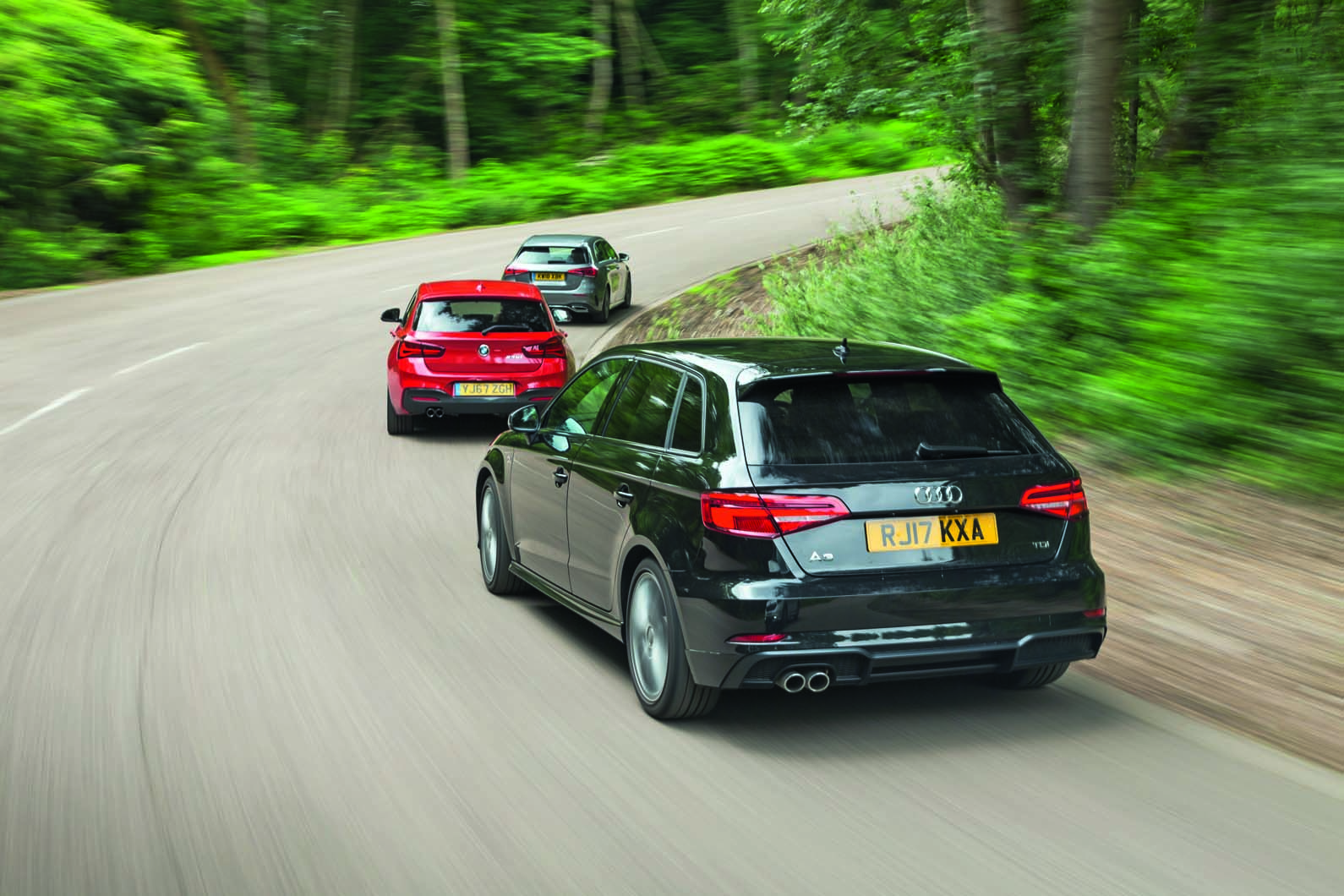
And so to continue a theme, and having just adjudicated on this three-way tussle between the new Mercedes (in big-selling A180d low-emissions diesel form) and its direct diesel rivals, I can also reveal with some certainty that there has never been a more ‘ambitious’ or ‘assertive’ A-Class than this. AMG models notwithstanding, there has never been a more ‘agile’ one, either.
So does all that mean it’s ‘all-conquering’ – or something of an ‘arriviste’? Better close my dictionary.com browser window and get on with the explaining.
Straight A:
This is the fourth instalment in the A-Class model genealogy. It isn’t very much like either of the first two. Having dialled down the ‘originality factor’ of the ingeniously packaged original 1997 A-Class by quite alot for the second-gen car in 2004, Mercedes pretty much abandoned the innovative spirit altogether for the 2013-model-year, third-gen A-Class. Once it was gone, it was never likely to return.
The fourth-generation version is longer and wider than both the A3 Sportback and 1 Series with which we’re directly comparing it here. Its overall length takes up more space at the kerb than that of all but the very largest C-segment hatchbacks (the Skoda Octavia, Honda Civic and Mazda 3).
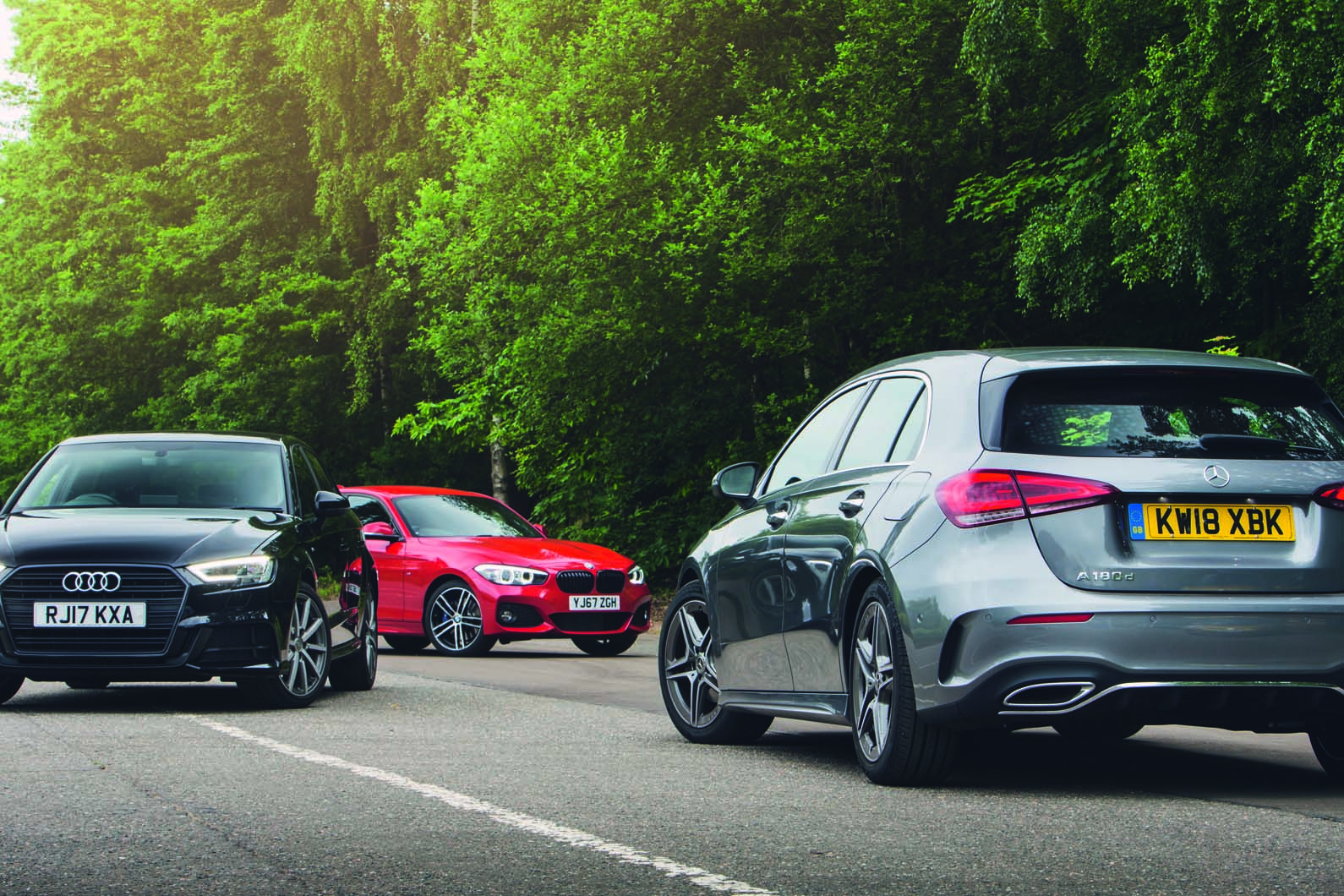
For anyone old enough to remember that this car started life in the mid-1990s on the strength of being ‘shorter than a supermini but as spacious as a family car’, that’ll probably seem quite a shift in positioning.
Should we regret it; bemoan it a bit, even? Perhaps, since it’s more evidence of the long, drawn-out death of variety in the wider car market. But I don’t think we can really blame Mercedes for making a hatchback big enough to suit the needs of most customers but also conventional enough in its layout and technical make-up to be capable of delivering equally well on ride and handling.
But hold on: is this really a car configured to deliver dynamically? While the A-Class offers a choice of 1.5-litre diesel, 1.4-litre turbo petrol and 2.0-litre turbo petrol engines at launch (for now all partnered with seven-speed dual- clutch automatic gearboxes), four-wheel drive, independent rear suspension and adaptive dampers are available on only the more powerful petrol A-Classes. They’re not offered on the A180d diesel that we’re testing here.
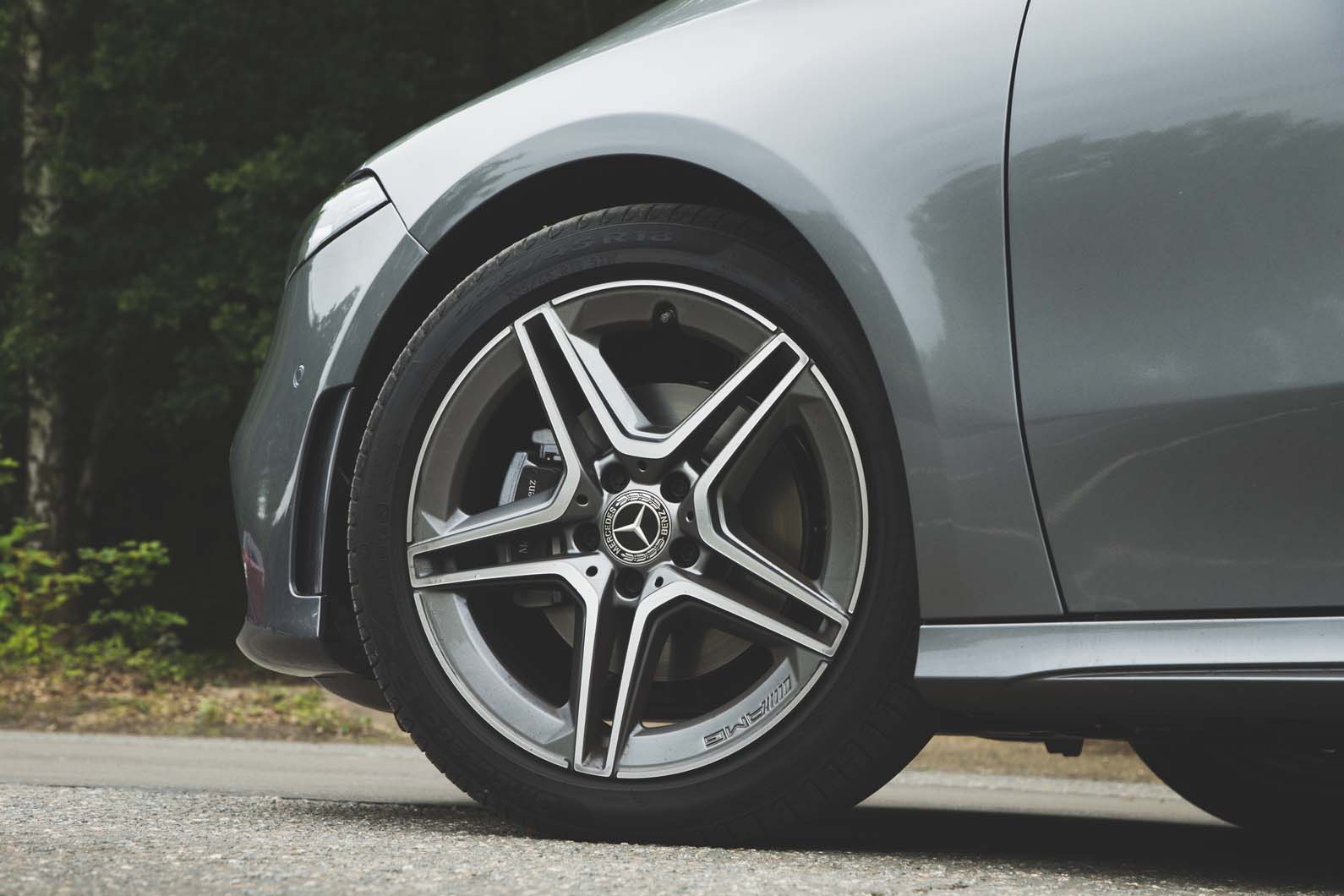
So in comparison with an A3 Sportback 1.6 TDI in Black Edition trim and a rear-driven 116d M Sport five-door, can the A180d’s controversial torsion beam rear suspension – the first like it ever to appear on a modern Mercedes- Benz passenger car – deliver the premium-worthy driving experience we’ve a right to expect? Spoiler alert: mostly, it can. Ride and handling are no longer likely to come between this car and wider market success. That’s the short version, anyway.
Inside story:
You don’t have to look very hard, or indeed to drive it at all, to find out what it is that ought to do most to improve the fortunes of the A-Class. The technological sophistication and perceived quality of the car’s interior is like nothing we’ve ever seen on a compact hatchback.
The sheer wow factor of our test car’s cabin – created by such a visually alluring mix of chrome and gloss black trim, the mix of brushed aluminium, soft leather and Alcantara, and even by the fine detailing of Mercedes’ heating and air conditioning controls – is so effective in making a small car feel expensive that, for a while, you’ll likely forget you’re in a humble hatchback altogether.
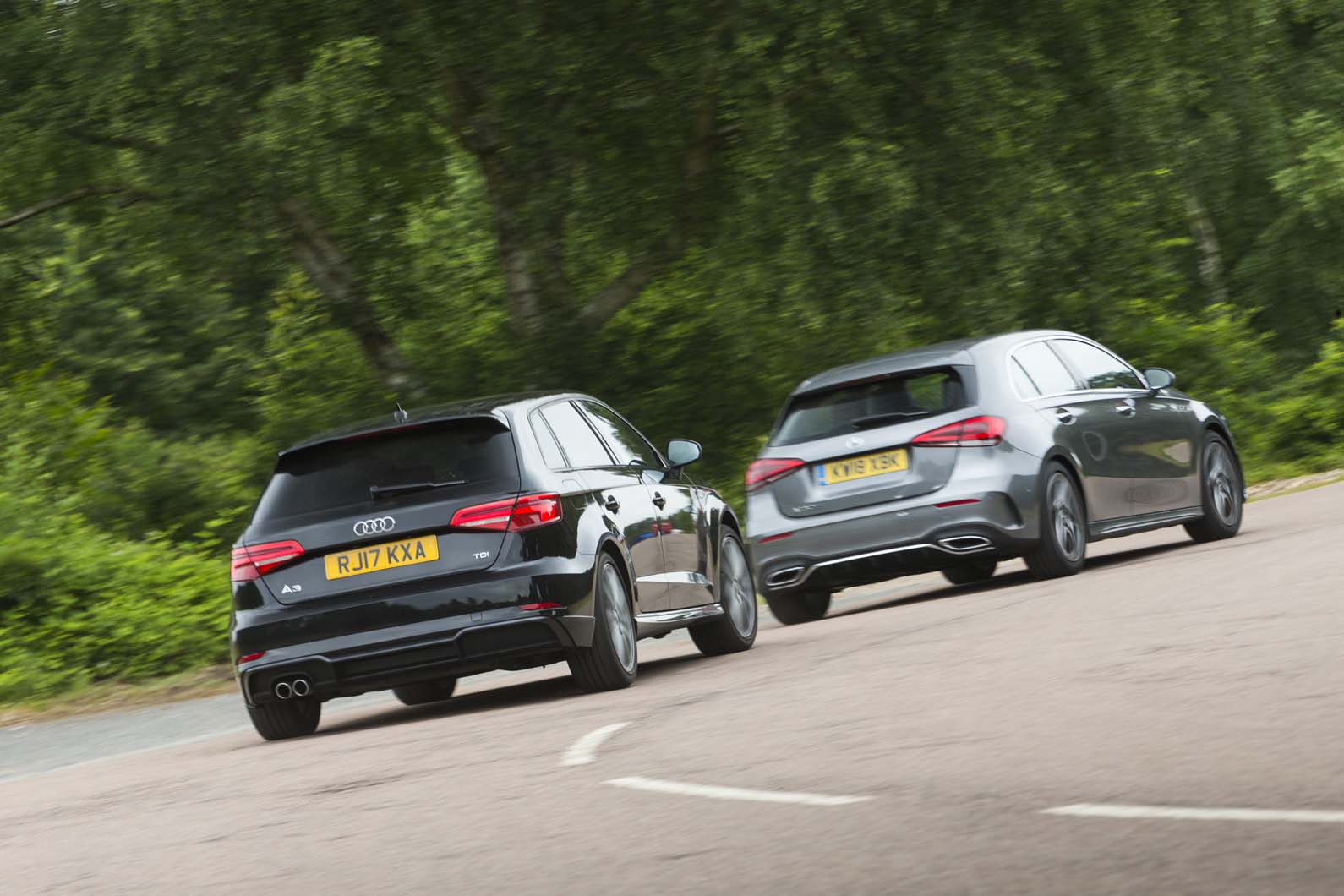
Five years ago, mind you, we were writing very similar things about the current A3. But then the Audi’s material lavishness never came partnered with quite the same sense of awe inspired by the twin 10.3in dashboard displays of the new A-Class. Even at the top-level AMG Line trim of our test car, they’re optional screens; but not to spend the money on the relevant equipment upgrade (£2395 for Mercedes’ Premium package) would be to miss out on so much of the cabin’s neon-tinged technological allure.
There’s no instrument cowl at all in the A-Class; just a perfectly symmetrical dashboard with two raised outer chrome-bezelled air vents; three lower centrally mounted ones inboard; and a pair of bright and crisp-looking widescreen digital displays that seem to hover just in front of the dashboard and make the A-Class feel, for the first time, like it’s cut from exactly the same cloth as Mercedes’ luxurious and advanced bigger saloons.
Unlike in those bigger Mercs, there’s no old-style rotary input wheel with which to navigate the infotainment system. Instead, there’s an improved fingertip entry pad on the centre console (which works much better than Merc’s older touch-sensitive input system, it must be noted). Or you can use the car’s voice recognition system (a new set-up called ‘Hey Mercedes’, which seems to work well) and the duo of thumb touchpads on the steering wheel in combination to master the car’s various secondary systems. You can even get an ‘augmented reality’ extension for the navigation system that superimposes turn arrows on a projected camera view of the road ahead, as if you were playing some real-life game of Mario Kart on the Crooked Billet interchange. If that sounds a touch distracting, trust me, it is exactly that.
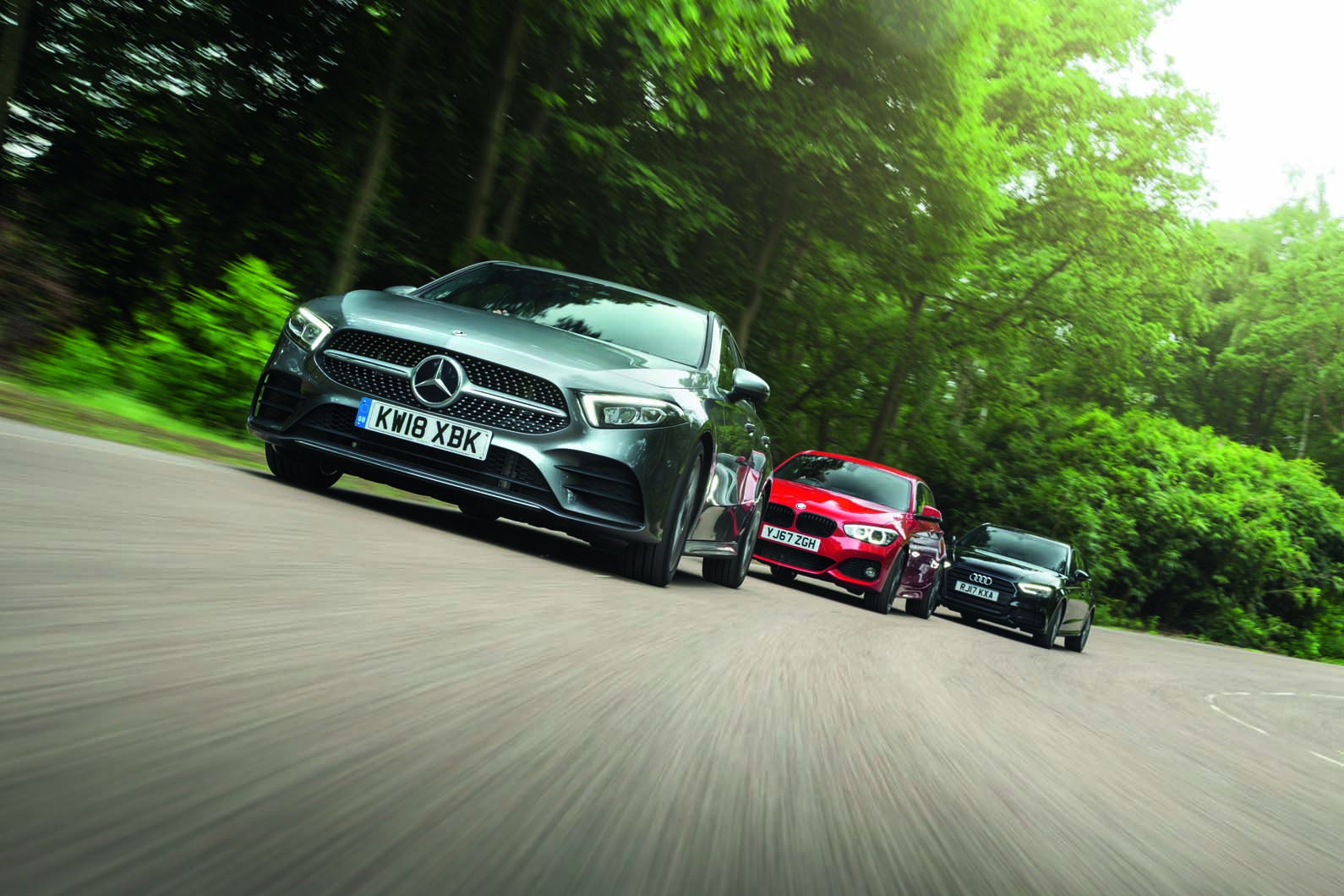
There’s no mistaking it, though: the new A-Class is tailor-made for tech lovers. But as impressive as it all undoubtedly is at first glance, great hatchback interiors are about more than just the latest gadgetry anda ritzy material sheen. And as you really interrogate the Mercedes’ cabin over an extended period, you begin to witness its overall standard start to slip just a little from ‘world class’.
First, you notice that some of the car’s switchgear and its fittings don’t feel quite as expensive as they look. From its window switches to its column stalks, an A3’s fixtures all feel more expensive as you variously click, f lick and snick them.
Then there’s packaging; because despite being the largest car here, the A-Class doesn’t quite seem that way from inside. Those oversized loop-shaped interior door handles look great, but they rob passengers of valuable knee room in both rows. Although the A-Class’s boot has grown, it’s still smaller than one of its German opponents’, at 360 litres. And while there’s improved passenger space in both rows, you’ll still find marginally more room in the back of the Audi (although there’s now less in the back of the 1 Series).
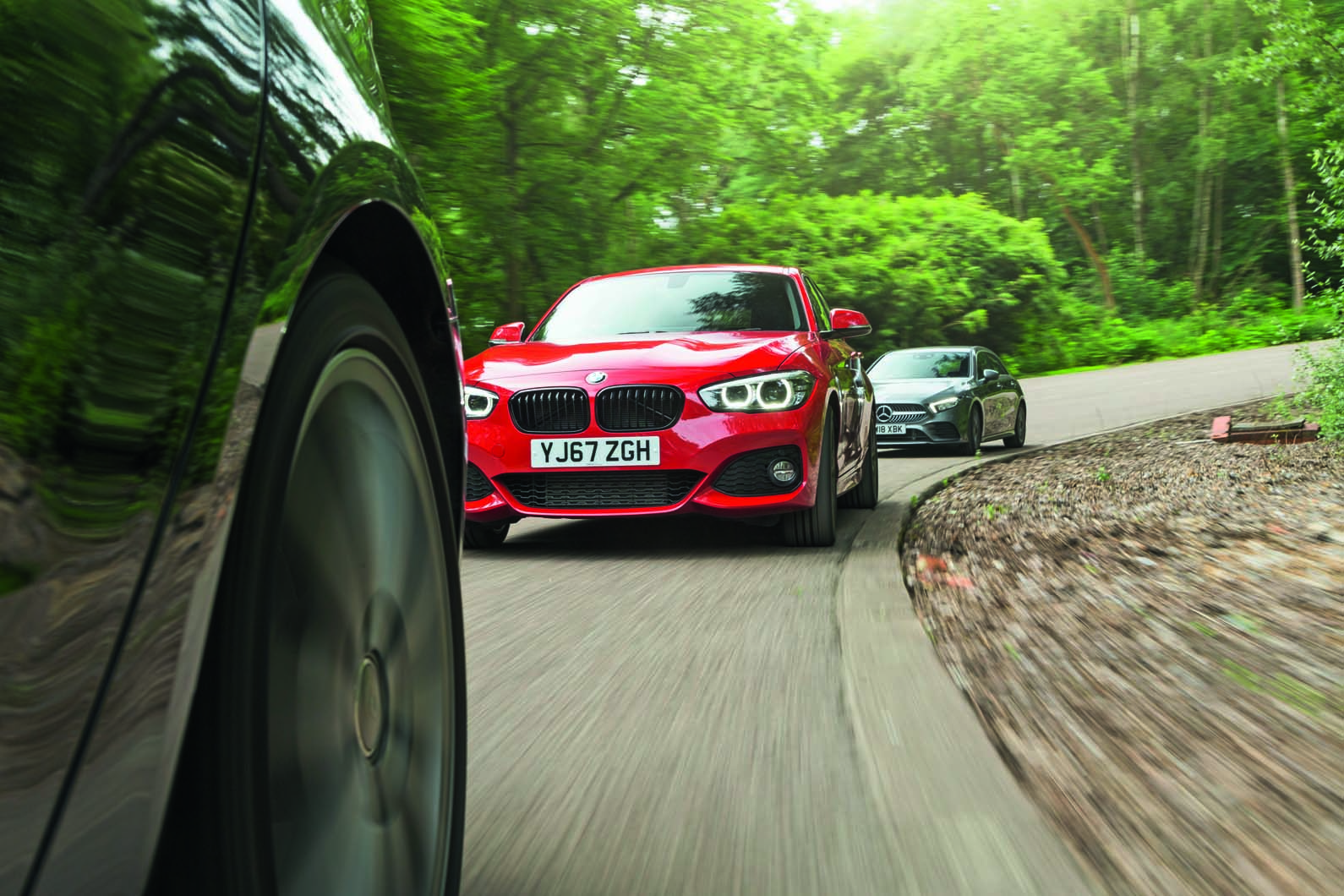
Close encounters:
On to driving experiences, then. All three of these cars offer peak power of exactly 114bhp. They are separated by less than half a second on claimed 0-62mph acceleration and just 4g/km of lab-test CO2 emissions. That speaks volumes about how hard-fought the fleet-dominated market for premium-branded diesel hatchbacks is right now. There’s just no room to give an inch on anything.
However, if figures like that lead you to believe that these cars will be all but indistinguishable from each other to drive, don’t be so sure. You don’t expect much from any of them in terms of outright performance, holding greater hope for some sporting appeal as a result of the rear-driven layout of the 1 Series, or the lowered, firmed-up sport suspension of either the BMW or the Audi.
And yet it’s the BMW that, for several reasons, struggles most plainly to produce the kind of performance and handling that most buyers would be willing to pay a premium for. The Audi and Mercedes both do better, going toe to toe to impress in their different ways, but ultimately one of them has a more complete hand of dynamic qualities than the other.
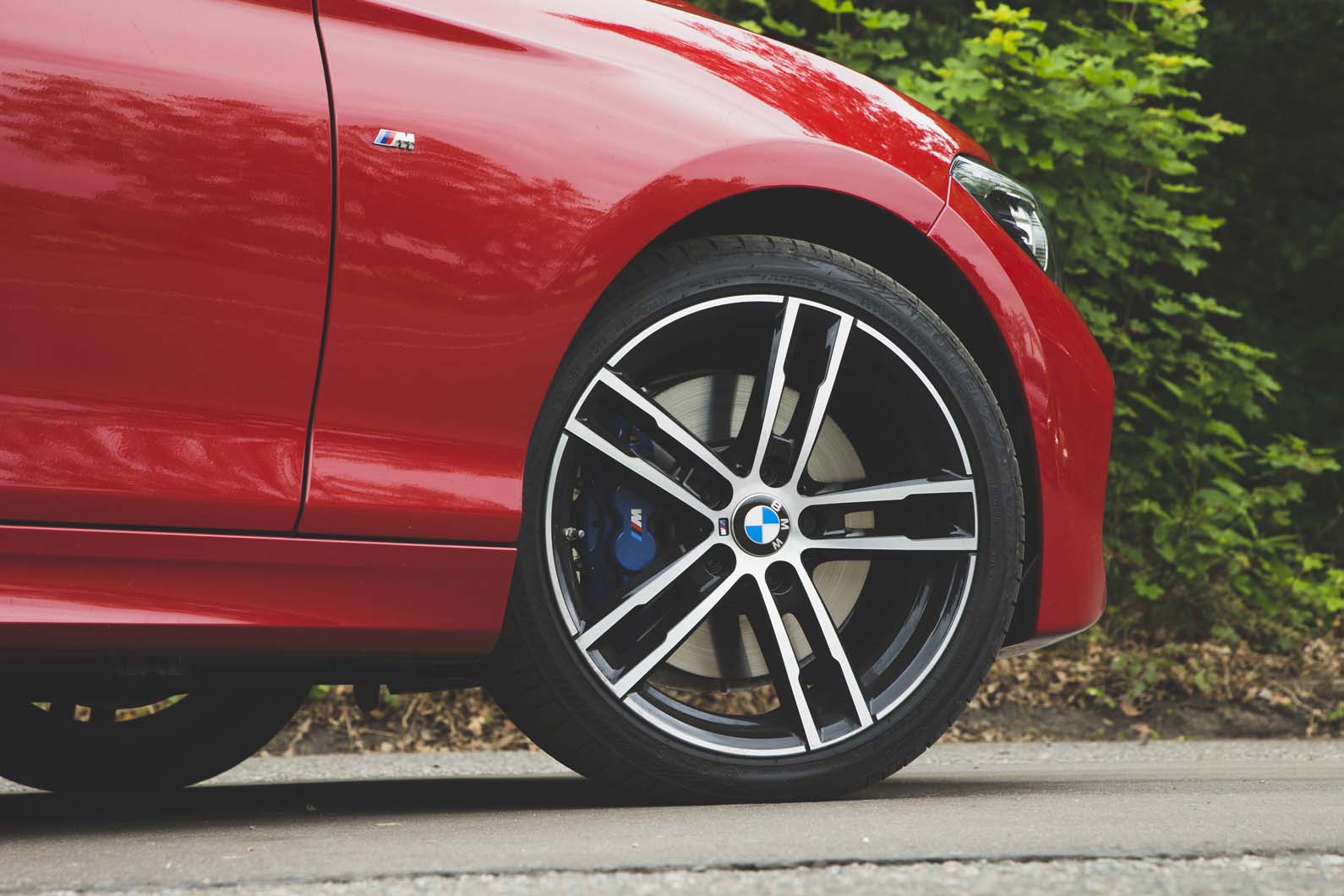
The on-paper torque statistics suggest that the BMW ought to feel like the car with the strongest engine here, but in fact the Audi does. Where the 116d’s 1.5-litre three-cylinder diesel has greater freedom to rev than either of its rivals’ diesel four-pots and has a likeable, industrious character, it’s relatively short on refinement at most crank speeds, is slow to respond at anything less than 2500rpm and seems to be short on mid-range torque. The A3’s 1.6-litre four is a little bit noisier and more breathless above 3500rpm but it is quieter than the BMW’s motor the rest of the time, has better low- and mid-range throttle response and feels much stouter when pulling hard from 2000rpm.
The A180d’s 1.5-litre four-pot diesel falls somewhere between the two. Although it is creditably smooth and quiet at cruising and idling speeds, it becomes almost as noisy as the BMW’s engine above 3000rpm and it has less usable range than the Audi’s. It has respectable mid-range torque, but its all-round drivability feels markedly weaker than the A3’s. And, it must be noted, the Getrag dual-clutch automatic gearbox that Mercedes has chosen for the car serves only to exacerbate the shortcomings of the A-Class’s diesel engine, since it tends to hang on to intermediate ratios for too long no matter which driving mode you’re using, instead of shifting up early and keeping that engine spinning at its torque peak.
On ride and handling, there’s another poor showing in evidence from BMW’s interesting but slightly inept 1 Series. On the road, the 116d behaves a little as if its body weight had been plonked unceremoniously on top of its wheelbase rather than cradled judiciously within it. The car’s body fidgets and jostles more often than either of its opponents, and it rolls more markedly too, seeming to need a split-second longer to settle and respond to steering inputs than it really ought to need.
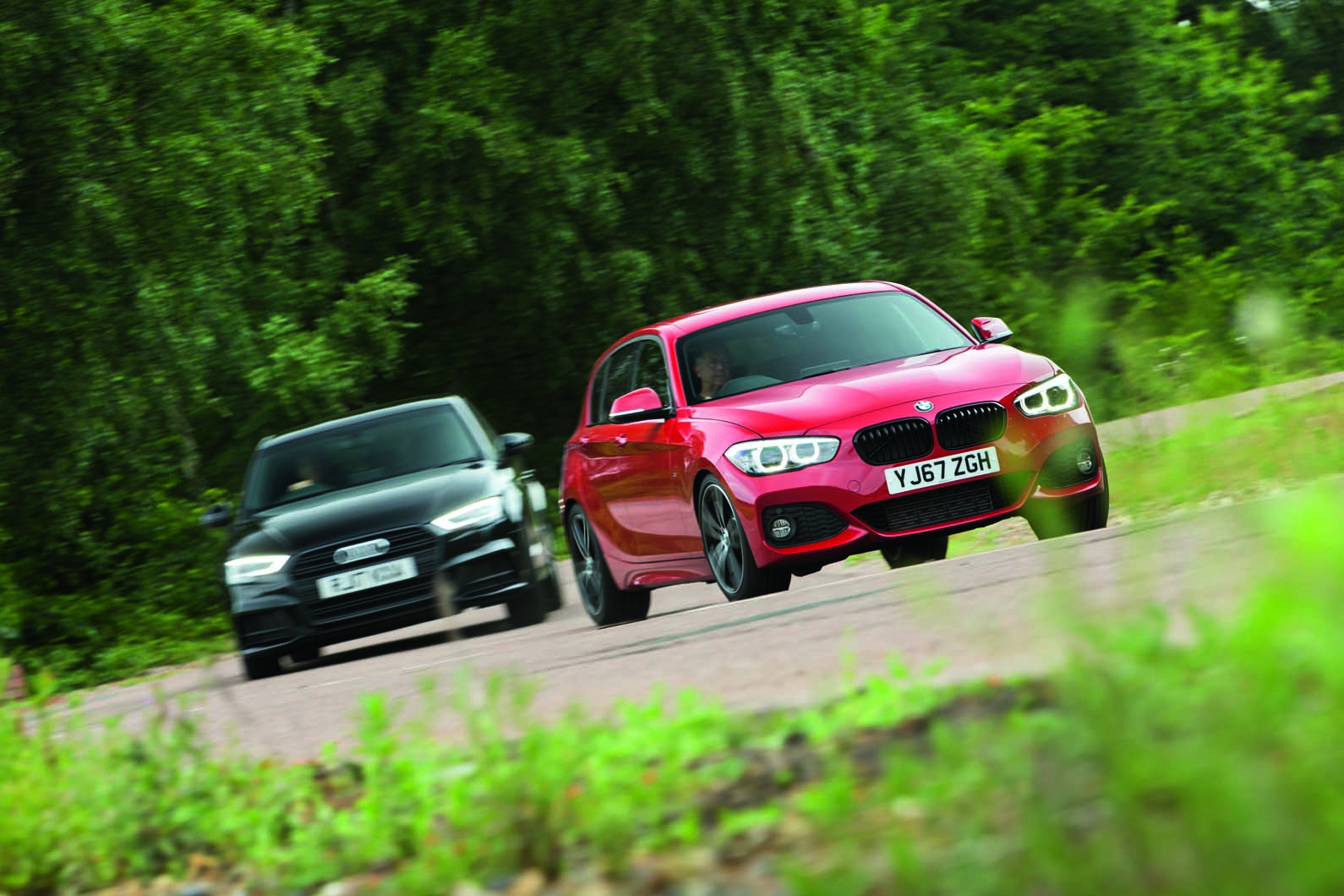
Both the A3 and A-Class have better close body control, crisper handling response and a more settled ride than the 1 Series – and yet there are key differences and relative attractions separating the German front-drivers too. Our Black Edition Audi came with passively damped sport suspension as standard, whereas the AMG Line Mercedes had what Stuttgart calls ‘lowered comfort suspension’ (although, confusingly, it’s the same set-up fitted to all twist- beam-equipped A-Classes).
The A-Class is the softer-riding of the two, as you might expect – but its handling only suffers by comparison with the A3 in terms of outright grip level. It steers more smartly than the Audi, turns as crisply and with better balance, and keeps its body almost as level. The A3 counters with a chassis that’s marginally more sure-footed and tolerant of being hurried along, although it’s a touch less engaging than the A-Class to drive. The A3 has the better outright body control of the two, but the less deft- and dexterous- feeling ride at normal road speeds. On balance, while someone in a hurry would probably prefer the A3, an interested driver would certainly prefer the A180d; even to the rear- driven BMW.
Which is just one reason among many why the new A-Class has the capacity to surprise. It’s a car that has made a giant leap towards the critical vanguard of the compact premium hatch pack, and it deserves boththe attention its eye-catching new looks will attract and a clean slate from which to impress anyone who has been less than convinced by its predecessors.
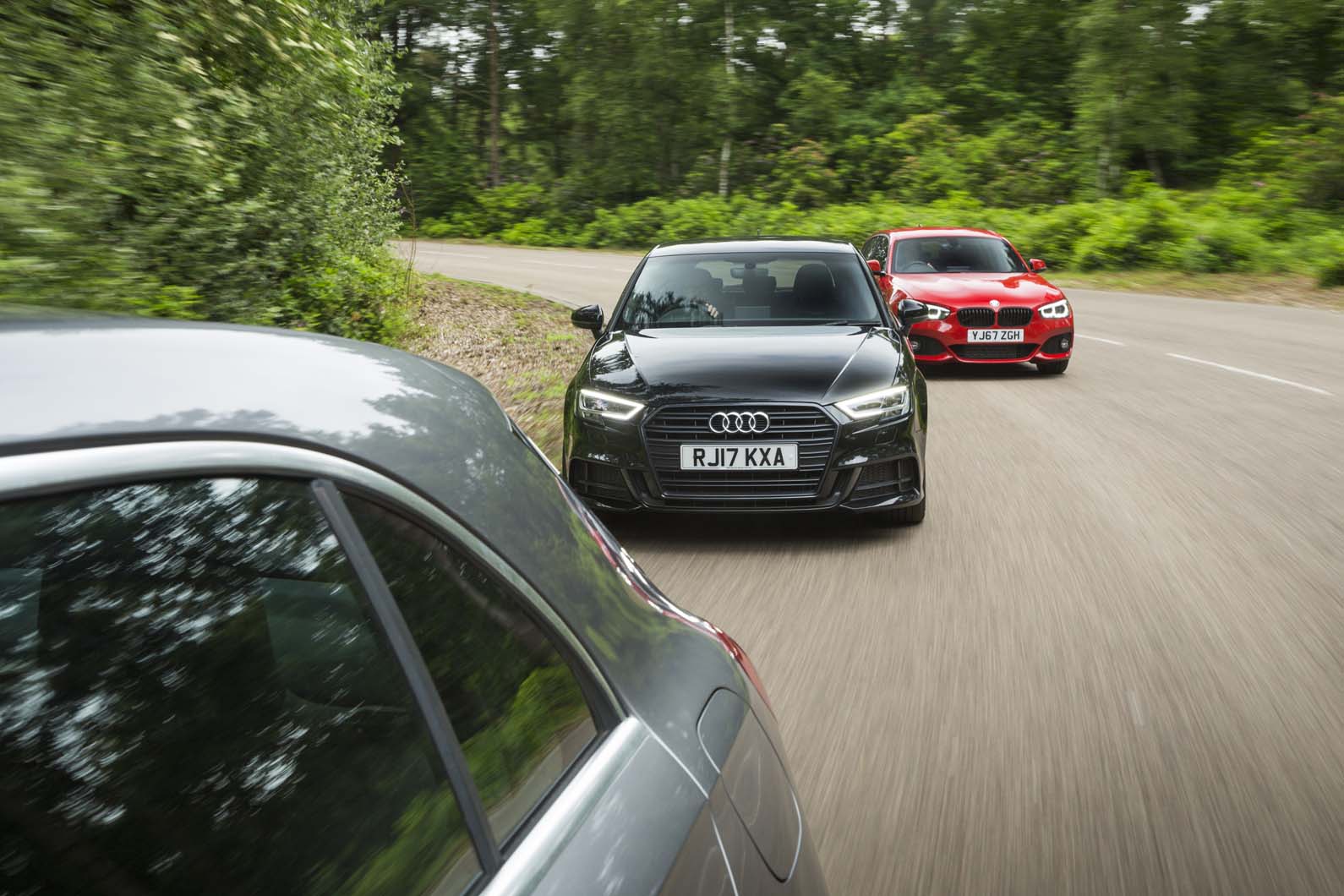
Is it good enough to dip for the tape in this exercise? Not quite. The A3’s blend of better space, deeper- seated quality, better refinement and performance and superior outright dynamic composure has to get itthe nod. If a low-emission diesel hatchback were on your agenda, it’d be the Audi I’d be sending you to test drive first.
But if other engines were part of the equation? I suspect the verdict could very easily flip the other way. Round one has slipped away for Mercedes here, then – but I sense that’s not the end of the story.
The best of the rest:
We chose to keep things simple here and let the A-Class compete with the wider hatchback field on another day. But had our test been open to the likes of the Ford Focus, Volkswagen Golf, Seat Leon, Vauxhall Astra and other non-premium five-doors, how many more humble family hatchbacks might have been capable of providing better ride and handling?
Where the non-premium ranks are concerned, I suspect only a well- specced Golf (pictured, right) would offer a more rounded and multi- talented chassis than the A-Class.
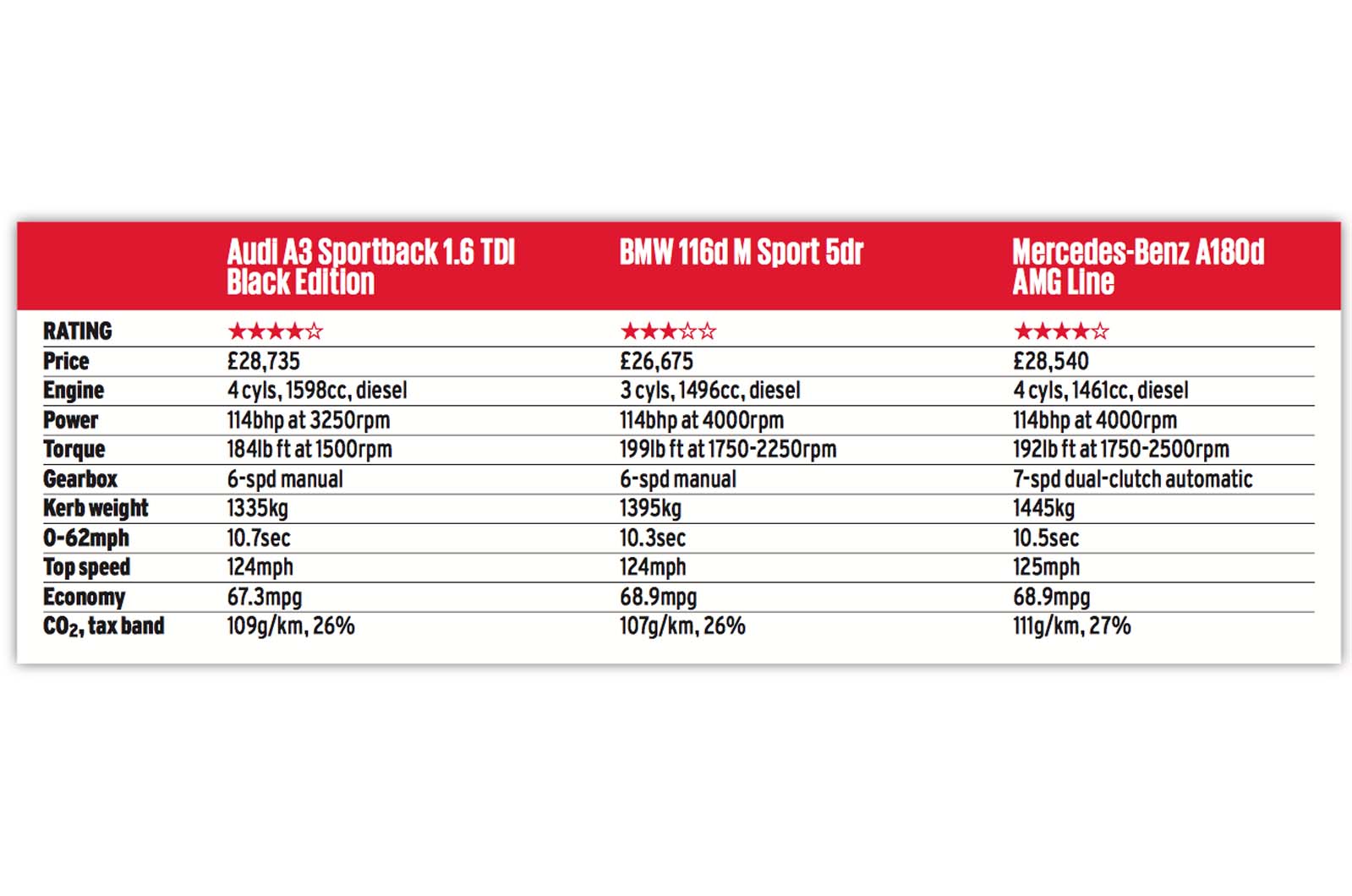
A Leon might come close for outright driver appeal, likewise a Focus (with an all-new one just weeks away) and a Mazda 3. But you can forget the rest: the Mercedes’ blend of handling balance and ride fluency is good enough to bat off most volume-brand challengers.
1st - Polished Audi sees o its new German rival. More practical and refined, with a stronger engine and no mean standard on interior quality
2nd - Disappointing powertrain and packaging come between the diesel A-Class and the class lead. Rich cabin and fluent, balanced handling, though
3rd - Rear-driven BMW still promises so much more dynamism than it delivers. Tetchy ride, coarse engine and tight interior
Read more
Comments
Post a Comment